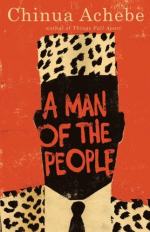
|
| Name: _________________________ | Period: ___________________ |
This test consists of 5 short answer questions, 10 short essay questions, and 1 (of 3) essay topics.
Short Answer Questions
1. What is Chief Nanga's previous occupation?
2. Why does the girl in Chief Nanga's best story refuse to remove her bra?
3. When Odili meets the group of foreigners, what initially brings him attention?
4. What does Peter eventually cook for his master while Andrew Kadibe is visiting?
5. What sort of buses does Chief Nanga purchase?
Short Essay Questions
1. Why does Chief Nanga remember Odili?
2. What attitudes do the foreigners at the dinner conversation seem to have toward Africa, and how do they demonstrate such?
3. What two admirable qualities does Chief Nanga demonstrate in Chapter 1, and how?
4. What personal goal does Odili not considering asking for help in achieving, as stated in Chapter 2?
5. Describe Odili in his first encounter with Elsie in Chapter 6.
6. Why does Chief Nanga scorn his old nickname, "M.A. Minus Opportunity"?
7. Why does Odili envy Peter?
8. What is ironic about Chief Koko's reaction to drinking OHMS?
9. Why is Odili surprised to be awakened early by Chief Nanga after his first night at the Minister of Culture's house?
10. How does Odili describe the way Jean acts toward Chief Nanga?
Essay Topics
Write an essay for ONE of the following topics:
Essay Topic 1
Analyze the resolution of the story. Does it seem just for a military coup to overthrow the government? What are the motives of the military? What does this say about justice and politics? How is the future of Nigeria portrayed in "A Man of the People"?
Essay Topic 2
Alone of all the political characters in the story, Odili rejects every sort of political corruption. Explicate and analyze this severe contrast between the absolute idealism of Odili, the absolute corruption and self-interest of Chief Nanga, and the practical abuse of corrupt individuals by Maxwell. Who is the most morally persuasive of the characters, and why?
Essay Topic 3
At the end of the story, it is said that Maxwell Kulamo is a martyr. Analyze this statement. For what was he a martyr? How does his martyrdom advance this cause? Other than his death, what other events in the story reaffirm his status as a martyr?
|
This section contains 728 words (approx. 3 pages at 300 words per page) |

|




